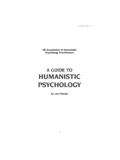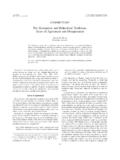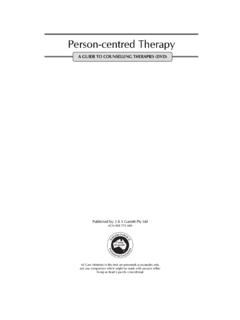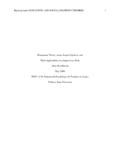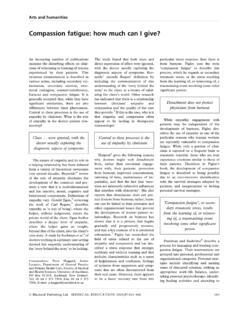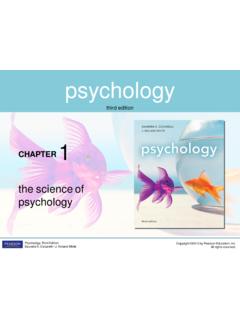Transcription of The effectiveness of Supportive Counselling, based …
1 The effectiveness of Supportive counselling , based on Rogerian principles: A systematic review of recent international and Australian research. Dr Nicky Jacobs and Dr Andrea Reupert PACFA, May 2014. This publication is copyright. No part may be reproduced by any process except in accordance with the provisions of the Copyright Act 1968. Suggested citation: Jacobs, N. & Reupert, A. (2014), The effectiveness of Supportive counselling , based on Rogerian principles: A systematic review of recent international and Australian research. Melbourne: PACFA. Acknowledgments: The review was generously funded by an anonymous philanthropic body.
2 Correspondence concerning this article should be addressed to: Dr Nicky Jacobs, Monash University, email: Dr Andrea Reupert, Monash University, email: Contents Foreword .. 1. Abstract .. 2. Introduction .. 3. Humanistic, non-directive or Supportive counselling .. 3. Method .. 5. Search 5. Eligibility Criteria .. 5. Results .. 6. Table 1: Country of Origin for Eligible Studies .. 7. Table 2: Presenting Problem or Diagnosis of Clients in Eligible Studies .. 7. Meta-analyses .. 8. Systematic reviews .. 9. Studies where SC/ST, PCT or a NDST was the primary therapy candidate.
3 9. Studies where SC/ST, PCT, NDST was compared as an equal therapy to other therapies .. 10. Studies where SC/ST, PCT or NDST was the control group .. 10. Australian research .. 11. Discussion .. 11. Conclusion .. 13. References .. 14. Appendix 18. Appendix 19. Appendix 20. Appendix 21. Appendix 24. Appendix 25. Foreword This document is a literature review of research into the effectiveness of Supportive counselling , intended as a resource for counsellors and psychotherapists. It demonstrates the effectiveness of Supportive counselling for a range of psychological conditions.
4 The PACFA Research Committee recognises that it is important to counsellors and psychotherapists that they have access to recent research evidence that demonstrates the effectiveness of different therapeutic approaches, to assist them in their practice. This review is one of a series of reviews that has been commissioned by the PACFA Research Committee to support its Member Associations in their work. It was written on behalf of the PACFA Research Committee. However, this does not imply that PACFA or its Member Associations endorses any of the particular treatment approaches described.
5 The Committee endorses the American Psychological Association's definition of evidence- based practice as the integration of the best available research evidence with clinical expertise in the context of patient characteristics, culture and preferences' (although we refer to a client or consumer rather than patient'). The Committee recognises that there is significant research evidence to indicate the effectiveness of counselling and psychotherapy and that different methods and approaches show broadly equivalent effectiveness . The Common Factors research, in particular, has shown the centrality of the therapeutic relationship, and the relatively minimal relevance of specific techniques, to positive therapeutic outcomes.
6 The Committee acknowledges that an absence of evidence for a particular counselling or psychotherapy intervention does not mean that it is ineffective or inappropriate. Rather, the evidence showing equivalence of effect for different counselling and psychotherapy interventions justifies a starting point assumption of effectiveness . It should be noted that this review is necessarily limited in its scope and examines the types of mental health issues that Supportive counselling is effective in treating. The Committee is committed to supporting PACFA Member Associations and Registrants to develop research protocols that will help the profession to build the research base to support the known effectiveness of counselling and psychotherapy.
7 We hope that you find this review, and others in this series, useful for your own research and advocacy purposes. We welcome your feedback. Dr Elizabeth Day Chair of the PACFA Research Committee May 2014. Page | 1. Abstract The purpose of this paper is to present a systematic literature review of the effectiveness of Supportive counselling (SC) based on Rogerian principles. This review of recent international (last five years) and Australian (last ten years) papers was employed using the PsycINFO, Ovid Medline, APAIS (Informit), Web of Science and Social Services Abstracts data bases.
8 Various terms were employed encompassing Supportive counselling (SC) including; Person Centred Therapy (PCT), Non-Directive Supportive Therapy (NDST) and Supportive Therapy (ST). A total of 26 international papers and two Australian papers met the inclusion criteria. Papers were grouped into (i) meta-analyses and systematic reviews (n=4) as well as papers (ii) where SC was the primary therapeutic candidate (n=10), (iii) where SC was equally compared to other therapies (n=3) and (iv) where SC was the alternative, control therapy (n=. 11). Various methodological issues were identified, primarily in the way SC was defined, implemented and compared to other therapies.
9 Overall, while a number of methodological issues preclude definitive claims, there is evidence to suggest that the group of therapies often referred to as Supportive are effective, and equally as effective as selected other therapies, in the treatment of adult depression. Page | 2. Introduction Many therapists identify with a humanistic or a Supportive orientation to therapy, in Australia and elsewhere. A 2004 survey of professional and clinical members of the Psychotherapy and counselling Federation of Australia found 12% of respondents nominated humanistic approaches as being their primary theoretical orientation (Schofield, 2008).
10 A somewhat larger percentage was found in the USA: from over 2,200 North American psychotherapists, Cook and colleagues (2010) found that a fifth (31%) identified with a Rogerian/client-centered/humanistic orientation. At the same time, the most commonly endorsed therapeutic techniques in this same survey were; conveying warmth and respect, communicating understanding of a client's experience, empathizing with the client, promoting clear, direct expression of client's feelings, making reflective or clarifying comments and cultivating the therapeutic relationship. These techniques are at the core of Rogers' (1957) person-centred approach, which focuses on building and sustaining a good therapeutic alliance.




